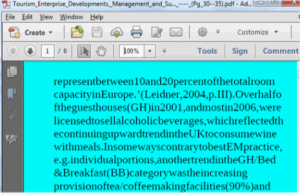
Sarah George is a Subject Librarian at the University of Bradford. She was made a National Teaching Fellow in 2017 – and her accessibility remit contributed significantly to that recognition. Here she gives a personal take on e-book accessibility and accessibility activism via research and evidence.
I am an academic librarian at the University of Bradford, covering the subjects of archaeology, chemistry, forensics and parts of engineering. Before becoming a librarian I was a field archaeologist, care assistant then the world’s worst lab technician. Here I write about the University of Bradford library’s work on accessibility of electronic books and journals (e-resources). This work was used as part of the evidence for my recent successful National Teaching Fellowship application.
Accessibility of e-resources
In the 20 years I’ve worked in libraries we’ve made huge improvements in inclusivity and accessibility. However, there still remain frustrating gaps between the possibilities and the realities, and nowhere is this more evident than in the provision of electronic books and journals (e-resources). These have huge potential to help people who have difficulty with printed texts whether through visual impairment, specific learning difficulties or motor problems. E-resources offer the possibility of reading-out-loud, changing the colour of backgrounds and font, auto-scrolling and much more. As in so many areas, what is good for accessibility is good for everyone – an article that automatically reads out loud could be just as useful for someone on a long bus journey as for someone with visual impairment. But often we find these useful features are blocked or unavailable, leading students with print-impairments to rely instead on alternative formats (alt-formats). This requires the student to order each source one-by-one, making the process of accessing information more time-consuming and convoluted for those students who already face additional challenges in their studies. It also removes the ability to browse and discover resources by serendipity enjoyed by their peers.
Very nice, now what’s it supposed to do?

On one occasion, I came back from a training session convinced that I had found the answer to the needs of one particular student. She has multiple disabilities and needed texts to be zoomed by 500%, meaning she had to tediously scroll backwards and forwards to see entire lines. We had been shown Reflow, a function of PDFs which fits the contents of a page into a single screen with no horizontal scrolling required. Hooray, the answer, this would make her life so much easier! All bushy-tailed, I booked an appointment to show her and her subject librarian how it worked. It didn’t. Not once, not a single article or chapter. Most of the time the reflow function did nothing, sometimes it removed the spaces between the words, which was less than helpful. After about 10 minutes of failure, she kindly asked me what it was supposed to do, said she would use if it if ever chanced to work, and left.
If in doubt, quantify it: ebook audits
This and many similar experiences induced the staff of the University of Bradford library to look at which resources were the most accessible. We often found that useful accessibility features were blocked by publishers’ legitimate considerations such as protecting their copyright or branding their content. The primary aim of our audits was to enable us to recommend the best platforms for print-impaired students, but we soon realised that we could feed back to publishers when accessibility features weren’t working. In 2013, the university put out a call for projects that could be undertaken by centrally-paid interns, and we realised this was our opportunity for a pilot audit. I met with the electronic resources and disability liaison librarians, scribbled some ideas about what should be tested literally on the back of an envelope and that was the basis for our first accessibility audit. The results were interesting but somewhat frustrating, as our intern had sometimes given up way too easily, writing off an entire database when he found one inaccessible paper.[1]
Our next audit in 2015 used library staff as the auditors, with the unexpected fringe benefit of upskilling our frontline staff – they found it helpful to be able to investigate our electronic resources in an unpressured environment rather than with a student enquirer watching them, and discover more about the range and functionality of each We also learned lessons about which browsers consistently supported accessibility features (Chrome was generally best) and found plug-ins such as the AT-Bar[2] that worked on all platforms and resources. Best of all from the staff perspective was a raised awareness of accessibility issues and confidence in dealing with them[3].
In 2016, a committee from universities around the country launched a national audit on a much grander and more comprehensive scale than anything we could have managed alone, with the design and execution based partly on the University of Bradford’s work[4]. They and JISC are now working with publishers to implement the results. In many cases, publishers were unaware that their content was not accessible and have implemented changes as soon as problems were reported.
If you can’t find it, write it
However, I still have one particular bee left in my bonnet. Although those working in disability support or libraries are left with little doubt of the impact of inaccessible e-resources on those with print impairments, we have no direct evidence. There is an opinion in academia, rarely expressed but, I fear, frequently felt, that the problems caused by reliance on alt-formats are an “administrative” rather than an academic problem. So a group of colleagues from libraries and disability services in various northern universities are proposing a project to investigate the impact of inaccessible e-resources on learning. We plan to do this firstly by surveying library and disability support staff about their perceptions of alt-formats as a learning issue then hopefully talking to students about their experiences. This idea is very much in embryonic form so if anyone would be interested in contributing we would be thrilled to hear from you!
Follow Sarah on Twitter @ewenicealamb
[1] https://www.sconul.ac.uk/sites/default/files/documents/6_14.pdf
[3] https://bradscholars.brad.ac.uk/handle/10454/8365
[4] https://sites.google.com/site/ebookaudit2016/home https://accessibility.jiscinvolve.org/wp/2017/02/07/ebookaudit-useabuse/
